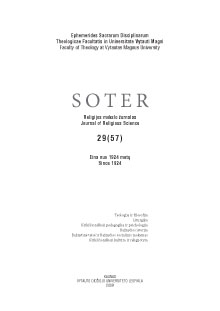Vyskupų konferencijos 1983 m. Kanonų teisės kodekse (III): normatyvinė galia
EPISCOPAL CONFERENCES IN THE CODE OF CANON LAW 1983: PROTEST OF NORMATIVE
Author(s): Petras SmilgysSubject(s): Christian Theology and Religion
Published by: Vytauto Didžiojo Universitetas
Keywords: Katalikų Bažnyčia; vyskupų konferencija; Roman Catholic Church; the Bishops’ Conference
Summary/Abstract: It is possible to state that Episcopal Conferences started a new period in their life together with Vatican Council II. Among many novelties, they gained normative power which they lacked before. The main source: decree Christus Dominus ch. 38. It was new to all the Church, in all its structures, especially, its juridical system. It is worth noticing that nowadays this normative law given to the Episcopal Conferences exceeds the limits of the Church and becomes the norm of the international law. Going deeper into this argument, it becomes clear that the introduction of this important norm in Episcopal Conferences was not met only positively, either during the process of preparation of the decree Christus Dominus or after its formulation and during the preparation of the corresponding norms for the valid Code of Canon Law. The main and only reason was: Episcopal Conferences were acknowledged as institutions, helping the bishops to fulfill their pastoral mission. In other words, these are the questions, concerning the nature of the Conference itself, because gaining the normative power, they become not additional, but structural power. Before formation of the final text of Christus Dominus ch. 38, 4 variants were offered, but the leading idea was how to diminish, to limit the importance of the decisions of Episcopal Conferences, making them only morally obligatory. Such decisions helped to protect a diocese bishop with his missio canonica in a diocese; everything introduced “as new” should serve as a means to the bishop’s pastoral office. A diocese bishop was understood as individual personality with his special power which should be preserved, otherwise it would restrict bishop’s freedom, and the Conferences would become “a new centralization”, “destruction of Church structure” or the distortion of hierarchic order. During the preparation period of valid Code of Canon Law, there were different opinions and disagreements for the same reasons: fear to restrict diocese bishops’ powers, their autonomy to be preserved. Canon 455 paragraph 4 speaks about it, even restricting the normative power of Episcopal Conferences. The valid Code essentially follows the teaching of Vatican II, and normative power is attributed only to the Episcopal Conference, but not to any commissions. Official documents, analyzing the theological nature of Episcopal Conferences, should have put an end to all disagreements and bring more clarity. The first and so far the only document, dealing with these questions on the level of Magisterium is MP Apostolos Suos. It brought much light on the question about theological nature of Episcopal Conferences, though left open air for the discussions. Apostolos Suos follows the teaching of Vatican II about the powers of diocese bishops and their role in the diocese, changing some premises, which later helped to interpret normative power of Episcopal Conferences. Episcopal consecration creates a specific link between bishops and the S
Journal: SOTER: religijos mokslo žurnalas
- Issue Year: 57/2009
- Issue No: 29
- Page Range: 51-68
- Page Count: 18
- Language: Lithuanian

